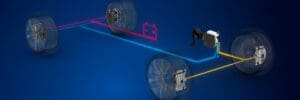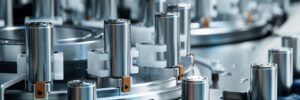The presentation describes an Evogen (TM) e-fluid technology from Lubrizol that can handle high-power density electrical drivetrains that effectively protects and cools inverter, e-motor and gearbox system. This means a combination of advanced hardware cooling approaches and an advanced fluid to prevent overheating of components. There is a benefit in this approach compared with the use of multiple coolants requiring different cooling & lubrication circuits with associated equipment which is not conducive towards high power densities.
The webinar will summarise consortium work by FlandersMake, Dana, Diabatix and Lubrizol and we present a full thermal-hydraulic model and assembly of an electrical drivetrain which is cooled by a single oil cooling & lubrication circuit using modeling environments and physical testing in actual hardware. The thermal-hydraulic models were verified using more advanced computational tools and was aimed to investigate the thermal response of the electrical drivetrains under varying load conditions and using different cooling approaches. Such an arrangement would not be possible without a suitable electrically insulating e-fluid which is described.
Reserve your spot—it’s free!
Other sessions at our Spring Virtual Conference include:
Charge Times of NACS vs J1772: What Charging Interfaces Will Look Like In 3 Years




This session will be an in depth look at Type-1 (SAE J1772) vs NACS (SAE J3400). With the commitment of many EV manufacturers to switch to NACS inlets in 2025, what does it mean for charging infrastructure and consumers?
In this session we will discuss the similarities and differences of Type-1 vs. NACS, and how consumers can navigate the differences, including technology like adapters. We will also discuss trends in the Mobility industry, including fast charging, liquid-cooled charging, and bi-directional charging.
Reserve your spot—it’s free!
See the full session list for the Spring Virtual Conference on EV Engineering here.




Broadcast live on April 15-18, 2024, the conference content will span the EV engineering supply chain and ecosystem, including motor and power electronics design and manufacturing, cell development, battery systems, testing, powertrains, thermal management, circuit protection, wire and cable, EMI/EMC and more.












